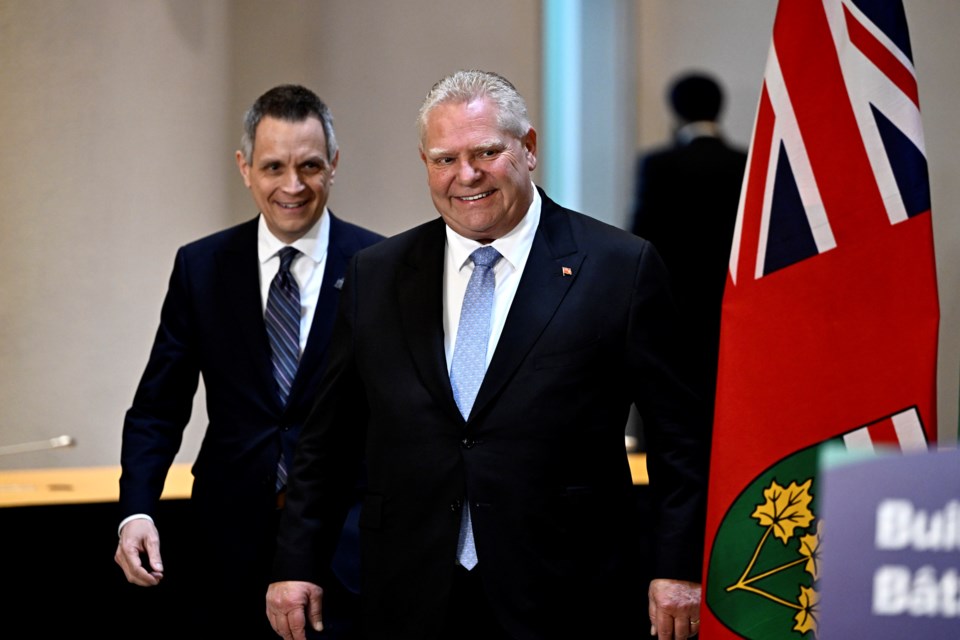Premier Doug Ford and Ottawa Mayor Mark Suttcliffe struck a half-billion dollar deal that’ll see the province take over a highway, pay for road repairs, build a new police station in the downtown core and more.
Some of the money is conditional on federal funds also flowing to the nation’s capital to help address the same problems. The two sides called on the federal government to provide an additional $493 million, which could bring the deal’s total value over $1 billion.
In exchange, the City of Ottawa promised to submit a plan to improve public safety within 120 days, build a new long-term care home at the Ottawa Hospital and open municipally-owned land for housing.
Ottawa is Ontario’s second largest city “and it’s an economic and service hub for all of Eastern Ontario. It shares a border obviously with our great neighbours in Quebec and it’s our nation’s capital." It also has a “unique” set of “economic and social challenges” that necessitated a special agreement, Ford said.
“We face challenges that no other city in the country faces,” Sutcliffe said.
“Our downtown core has been dramatically impacted by a number of factors, including the reduced number of people who are going downtown to work every day. A lot fewer people are using our transit system. As a result, there’s been a significant increase in homelessness, in substance use disorder, in mental illness," the mayor said.
The $543-million dollar deal is split between cash for capital projects and ongoing operating expenses.
Nearly $350 million will go to capital projects such as uploading Ottawa Road 174, building a new interchange along Highway 416, advancing the Kanata North Transitway, and repairing rural roads outside the urban core.
The deal also references $118 million from the province’s Building Faster Fund, which gives municipalities extra cash for meeting their housing targets. Ottawa is currently on track to meet the goal, having built 10,313 of its 11,073 target.
Nearly $200 million is for operational expenses to address homelessness supports, public safety, economic growth and road maintenance.
The province will give the city up to $120 million for shelters, contingent on federal support for refugees and asylum seekers. Nearly $50 million is earmarked for a new police station in the ByWard Market and a heavier police presence. Some of the $50 million depends on the federal government also spending more to bolster security for protests and other events.
It’s the second “new deal” the Ford government has struck after the premier and Toronto Mayor Olivia Chow announced a massive agreement late last year.
It further opened the floodgates to other cash-strapped cities asking the province for more money and a new fiscal relationship between municipalities and the province.
Thursday’s announcement “is further proof of the structural funding challenges that municipalities across the province are experiencing, and the need for a systematic review of the provincial-municipal fiscal framework,” said Colin Best, president of the Association of Municipalities of Ontario (AMO).
AMO will continue to lobby the province for a “joint review,” Best said.
Ontario’s Big City Mayors Caucus (OBCM), made up of 29 mayors from Ontario’s largest cities, also welcomed the funding and echoed AMO’s calls for a new fiscal arrangement between the province and municipalities.
“The province’s new deals for both Toronto and Ottawa have shown that they recognize that Ontario’s big cities are struggling to meet the financial demands of continuing to deliver and pay for infrastructure and services that are the responsibility of the province,” OBCM said in a release.
“Municipal taxpayers are collectively subsidizing the province to the tune of $4 billion a year, and all municipalities deserve a new financial deal to address these rising costs … our cities and taxpayers deserve a change in how tax dollars are allocated between governments to make things more efficient and fairer for everyone.”
Enid Slack, director of the Institute on Municipal Finance and Governance, said she’s glad the province worked with Ottawa to solve some pressing issues but is wary of how much money is contingent on federal support.
It’s also not a long-term solution, she said.
“It's not looking at the fundamental structure out of what cities do and how they pay for it. In a few years, the city will have to go back to the province and ask for money again. That's not sustainable in the long run,” she said.
Housing and Municipal Affairs Minister Paul Calandra said he wasn’t concerned that the “unique” conditions behind the deal could easily apply to other cities, bolstering their case for a deal of their own.
“We're constantly working with with our municipal partners to address some of the very important needs that they have, but in particular, Ottawa and Toronto. Ottawa is the national capital. Toronto is our financial capital of the entire country, and they have some very, very pressing needs,” he said at Queen’s Park shortly after the announcement.
Ottawa Liberal MPP John Fraser said the province has “opened the door” to more cities asking for special treatment.
“They should and will ask for it.”
Fraser also criticized the deal, saying it shortchanged the nation’s capital compared to what Toronto got.
“If you look at it on a per capita basis it doesn’t compare to what happened in Toronto. Uploading (Highway) 174 … is not the same as uploading the Don Valley Parkway, which has tremendous infrastructure demands.”
The Toronto deal included the province taking over the Don Valley Parkway and Gardiner Expressway, which provided billions in financial relief for the city.
“I think the thing that strikes me the most is there’s no money for Ottawa transit,” he added. Toronto got up to $1.2 billion to help operate the Eglinton Crosstown LRT, $300 million for regular TTC operational funding, and money to pay for new subway trains.




